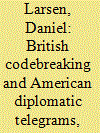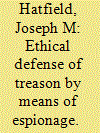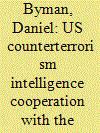|
|
|
Sort Order |
|
|
|
Items / Page
|
|
|
|
|
|
|
| Srl | Item |
| 1 |
ID:
151110


|
|
|
|
|
| Summary/Abstract |
During the First World War, British intelligence solved the United States' diplomatic codes and were reading its diplomatic telegrams transmitted between Washington and US diplomatic outposts throughout Europe. Controversy has emerged over when the British succeeded in solving these codes, with two historians relatively recently having claimed that British intelligence succeeded in doing so from the beginning of the war or soon after. Through a thorough consideration of the available documentation, this piece aims to correct these mistaken claims and to date the completion of the British solving of American codebooks to the middle phase of the war, to between October 1915 and January 1916. It seeks to lay reliable foundations for further work by showing that research into the wartime impact of British signals’ intelligence on Anglo-American relations is necessarily limited to only the middle and later phases of the war.
|
|
|
|
|
|
|
|
|
|
|
|
|
|
|
|
| 2 |
ID:
151106


|
|
|
|
|
| Summary/Abstract |
This essay argues that treason by means of espionage is ethically justified when six factors are present, two of which are: that the political community being betrayed fails to secure for its citizens basic human rights and other means of peaceful or otherwise lawful protest are unavailable. The paper begins by analyzing the application of several theories of ethics to treason, including: consequentialism, deontology, the Just War tradition, and Michael Walzer’s influential concept of ‘dirty hands.’ It then criticizes these points of view and offers an account of jus ad proditione per intelligentia (just treason by means of espionage) based upon Aristotelian thinking about ethics and politics.
|
|
|
|
|
|
|
|
|
|
|
|
|
|
|
|
| 3 |
ID:
151105


|
|
|
|
|
| Summary/Abstract |
The post-World War II Australian military war crimes trials of Japanese from 1945–51 have been criticised for using a rule of evidence considerably relaxed from the ordinary requirements of a criminal trial, one that did not require witnesses to give evidence in person. Circumstantial evidence suggests that, in relation to a trial held in Darwin in March 1946 for war crimes committed in Timor, the secretive Special Operations Australia, otherwise known as the Services Reconnaissance Department (SRD), took advantage of the rule. This article argues that the SRD did not allow their members to give evidence in person in an attempt to control and limit the dissemination of information about their operational and security failures in Timor from 1943–45. The SRD operation was adjudged by its own official historian as displaying ‘gross inefficiency and criminal negligence’. While the SRD’s failures were known to select personnel at the time, access restrictions to archival records in the post-war period, including the war crimes trials, meant that the extent of its failures and how it appeared to manage knowledge of them has not been widely known.
|
|
|
|
|
|
|
|
|
|
|
|
|
|
|
|
| 4 |
ID:
151104


|
|
|
|
|
| Summary/Abstract |
The ticking-bomb scenario is a thought experiment designed to establish the moral permissibility of interrogational torture in a limited number of circumstances on utilitarian grounds. This article demonstrates that utilitarianism does not support the use of torture in any circumstances, not only because another method of interrogation is more efficient and effective, but also because the practice of interrogational torture undermines individual security and, in turn, the ability of authorities to provide collective security. Therefore, utilitarianism demands the absolute prohibition of torture.
|
|
|
|
|
|
|
|
|
|
|
|
|
|
|
|
| 5 |
ID:
151109


|
|
|
|
|
| Summary/Abstract |
Founded in 1962, the National Intelligence University has evolved over more than five decades into living up to its current vision as ‘The Center of Academic Life for the Intelligence Community.’ With the intelligence reforms post-9/11 and the development of the NIU concept, the mission has changed from a military-centric focus of instruction to educating a more diverse audience from throughout the IC, both military and civilian, full-time and part-time, active and Reserves, with an emphasis on taking higher education to an interagency clientele spread globally and desiring different learning outcomes. The result is a rapid growth in offsite academic centers and a resurgence of certificate programs geared to professionals who already have a degree but wish to enhance their credentials in intelligence specialty fields. There is also an effort to revive concentrations and programs of study. This article outlines the steps NIU is taking to make itself more flexible and marketable to a growing and demanding academic audience that is much more than the uniformed DoD students who matriculated in the past with full-time resident study as their only option.
|
|
|
|
|
|
|
|
|
|
|
|
|
|
|
|
| 6 |
ID:
151107


|
|
|
|
|
| Summary/Abstract |
Operation Sussex was an intelligence operation undertaken by the Allies in occupied France shortly before the Normandy invasion. English and American officers trained French agents to parachute into France, spy on German military movements, and send information back to London via radio. The Germans exposed a number of the Allied agents; nonetheless, the operation proved a major success. The key threat to Sussex came not from the Nazis, but from bureaucratic conflicts among the Allies. Despite the operation’s significance, the scholarly literature on it remains sparse. The foundation of this paper rests upon little used documents from various collections.
|
|
|
|
|
|
|
|
|
|
|
|
|
|
|
|
| 7 |
ID:
151108


|
|
|
|
|
| Summary/Abstract |
Some public health crises become threats to national security. In April 2009, the Veratect Corporation provided a series of escalated warnings to key members of the international public health community regarding unusual respiratory disease reporting activity in Mexico, later referred to as the 2009 H1N1 influenza pandemic. The warning sequence of the H1N1 influenza pandemic highlighted potential complementarity between that of an intelligence-inspired warning culture vs. a risk-averse, forensically oriented response culture favored by traditional public health practitioners. Both are required to address the current range of difficult-to-predict public health crises that become a threat to national security.
|
|
|
|
|
|
|
|
|
|
|
|
|
|
|
|
| 8 |
ID:
151111


|
|
|
|
|
| Summary/Abstract |
Gordon Welchman was a Cambridge mathematician, who arrived at Bletchley Park (BP) on 4 September 1939 and worked there throughout World War Two. His remarkable contribution to BP’s wartime success was achieved without any previous experience of cryptography or signals intelligence. He was in fact, a lecturer in algebraic geometry and Dean at Sidney Sussex College, Cambridge. In 1938, he was approached by Alastair Denniston, the head of the Foreign Office’s cryptography section, the Government Code and Cypher School (GC&CS). He accepted Denniston’s request that in the event of war, he make himself available for intelligence work and in March 1939, attended a brief course on the principles of cryptography. In the early years of World War Two he was transformed into a key figure in the triumph of BP.
|
|
|
|
|
|
|
|
|
|
|
|
|
|
|
|
| 9 |
ID:
151103


|
|
|
|
|
| Summary/Abstract |
The US struggle against global terrorist groups depends heavily on intelligence cooperation, particularly with developing world countries that are autocratic. This dependence creates many problems. Autocratic allies often have politicized security institutions to prevent a coup and maintain the regime in power. Services will be reluctant to cooperate on areas of high regime sensitivity. Internal communication and information sharing is poor, and security services are often pitted against one another. In addition, the regimes often lack democratic legitimacy, corruption flourishes by design, and many senior leaders are chosen for loyalty, not competence. American influence will be limited, and at times providing fewer resources may gain more influence than providing more assistance.
|
|
|
|
|
|
|
|
|
|
|
|
|
|
|
|
|
|
|
|
|